May 21, 2025 | 04:06 GMT +7
May 21, 2025 | 04:06 GMT +7
Hotline: 0913.378.918
May 21, 2025 | 04:06 GMT +7
Hotline: 0913.378.918
The fourth Global Conference of the Sustainable Food Systems Programme with the theme "THE TRANSFORMATION WE NEED: Emerging from global crises by shaping sustainable, resilient, healthy, and inclusive food systems” hosted by the Ministry of Agriculture and Rural Development of Vietnam opened its frist session in Hanoi on April 24.

Overview of the conference. Photo: Tung Dinh.
This is a high-level conference which welcomed the participation of more than 300 delegates, including nearly 200 international delegates from many countries, United Nations agencies, and international organizations.
Regarding senior leaders, there are the Ministers of Switzerland, Malawi, Rwanda, Ethiopia, Cambodia, Saint Vincent and the Grenadines; Deputy Minister of Ghana, Kenya; Executive Director of the United Nations Industrial Development Organization (UNIDO), Global Director of Partnerships and Advocacy of The Consultative Group on International Agricultural Research (CGIAR), Director General of the Alliance of Bioversity International and CIAT. The Minister of Agriculture of Costa Rica and the Director-General of FAO also attended the event in the online form.
As for the participants from Vietnam, Deputy Prime Minister Tran Luu Quang chaired the conference. Leaders of the Ministries of Agriculture and Rural Development, the Ministry of Foreign Affairs, the Ministry of Health, the Vietnam Farmers' Union and relevant agencies at the central and local levels, as well as large domestic and foreign corporations and enterprises also attended the event.
The fourth Global Conference of the Sustainable Food Systems Programme takes place in the context that countries around the world are concerned about the risk of food insecurity due to the impacts of climate change, biodiversity loss, emerging pandemics such as COVID-19, conflicts, and rising prices of input serving food production. More than ever, the situation calls for a need for a rapid and drastic transformation in the way we produce, process food and handle emissions.
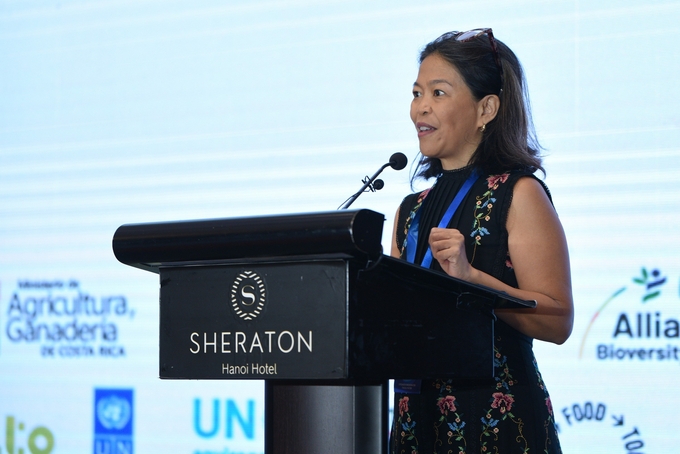
‘The goal of the One Planet Network’s Food System Program is to work towards a sustainable food system,’ said Ms. Dada Bacudo at the beginning of the conference. Photo: Tung Dinh.
The conference aims to review the main barriers, difficulties and challenges related to the transformation of food and food systems and propose solutions, focusing on four issues: Global model/architecture of food systems; National and local policies and governance on food systems; Consumption and production patterns of the food system; Methods of implementing food system transformation.
The conference will also introduce good and outstanding models of food system transformation in countries as well as international initiatives. The conference also hoped that countries would share actions, initiatives and tools to sustainably transform and strengthen food systems.
Making the opening speech, Deputy Prime Minister Tran Luu Quang, welcomed the partcipants and highly regarded the conference host for its selection of the theme for the fourth Global Conference of the Sustainable Food Systems Programme One Planet Network: “Together transform a food system that is healthy, sustainable, adaptive to climate change and inclusive in the context of new crises”.
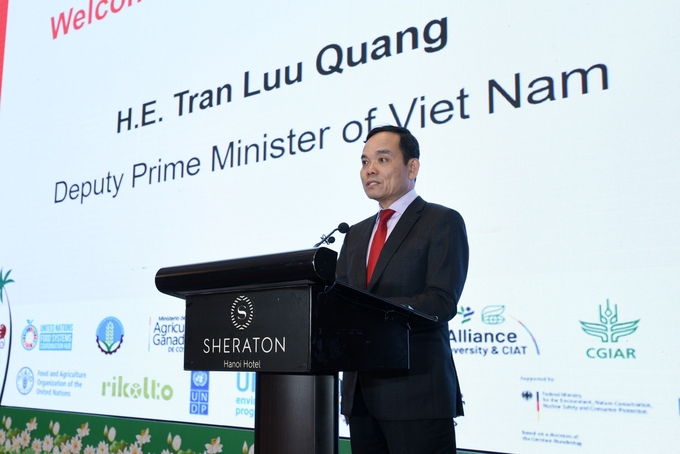
Deputy Prime Minister Tran Luu Quang affirmed that Vietnam will become a transparent - responsible - sustainable food producer and supplier. Photo: Tung Dinh.
According to Deputy Prime Minister Tran Luu Quang, FAO reports (2020, 2021) show that hunger is still on the rise with the number of people affected reaching 828 million by 2021. The Asia - Pacific region is expected to meet its sustainable development goals (SDGs) only by 2065, which is three and a half decades behind schedule. “The issue has become more urgent than ever, and now - not any other time - we must act to protect the planet - the home of all of us and the generations to come”.
On March 28, 2023, the Government of Vietnam issued the "National Action Plan to transform a transparent, responsible and sustainable food system in Vietnam by 2030” to implement Vietnam’s goal of becoming a transparent - responsible - sustainable food producer and supplier. Vietnam has confirmed this commitment at the 2021 United Nations Food Systems Summit.
With sincerity and respect, Viet Nam expressed gratitude towards the UN organizations specifically the the Sustainable Food Systems Programme), international community, sponsors, research agencies, NGOs, and the business sector for the valuable support in the past period and look forward to continuing to receive support and assistance in the near future.
"Vietnam also affirms its willingness to share experiences and cooperate with other countries in agriculture and rural development, especially through the South-South cooperation program and tripartite cooperation in agriculture," said Deputy Prime Minister Tran Luu Quang.
According to Ms. Estrella “Esther” Penunia, Secretary General of the Asian Farmers' Association (AFA), natural disasters, climate change, pandemics, and political conflicts have aggravated and severely affected the lives of households. These effects cause food prices to increase 2 or even 3 times. As a result, people, especially those in remote and disadvantaged areas, have little opportunity to access nutritious food sources.
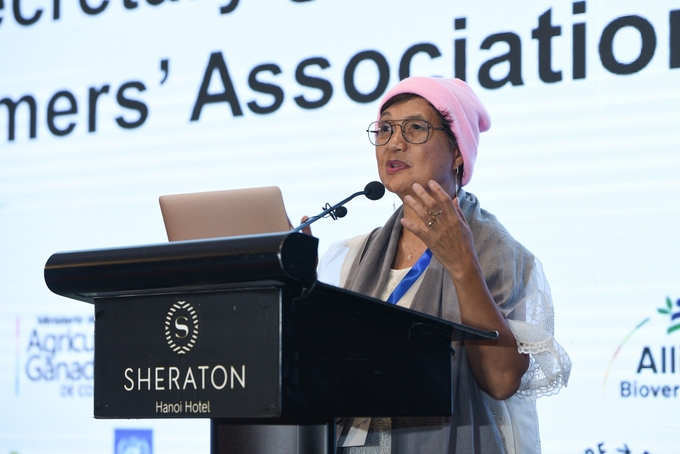
Ms. Estrella “Esther” Penunia, Secretary General of the Asian Farmers' Association (AFA): “We need to do it now, do it together to transform food production before it is too late, to prevent the issues of poverty an biodiversity loss from becoming more severe”. Photo: Tung Dinh.
In some areas, farmers even have to sell their land or their main means of production. This places urgent requirements on the transformation of the food system to ensure nutrition and overall health for all parties, especially the disadvantaged, ensuring the element of equality as well as fairness for all parties, “leaving no one behind”.
Currently, countries have achieved many positive results, but new efforts are still needed. However, there is still a lack of cohesion between different sectors and areas in terms of health and education, reducing the effectiveness of joint efforts. Along with that, it is necessary to associate sustainable development with policy formulation, and at the same time ensure the possibility of issues related to agriculture such as seeds, technology, financial support. In the Philippines, there is a saying: “we can start with small steps”, and from it, we make a total, holistic impact.
Moreover, food security is related to management, competitiveness to attract foreign FDI, and innovative solutions. Effective food product management needs to be implemented synchronously at local, national, and global levels. The governance model must therefore be fair. Farmers also need to be seen as partners, attain the opportunity to provide solutions instead of simply being beneficiaries.
AFA represents the voice for its members, bringing direct solutions to achieve SDGs, join hands in the process of building resilient agriculture, enhancing ecological farming. The approach based on the food system needs to take into account all stakeholders in order to create a sustainable aspect for the objects.
“We need to do it now, do it together to transform food production before it is too late, to prevent the issues of poverty an biodiversity loss from becoming more severe. Southeast Asia is home to innovative agricultural development hubs. We can build ideas together, taking this as a starting point to join hands to transform to a sustainable food system,” said Ms. Estrella “Esther” Penunia.
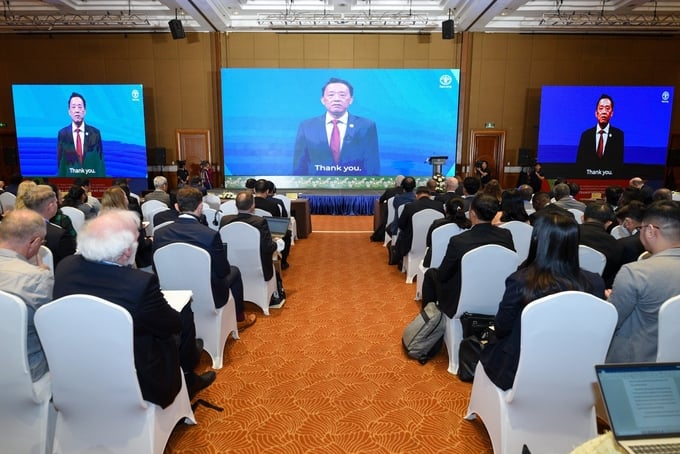
According to Mr. Qu Dongyu, FAO is committed to working with all parties to develop better production, better environment, "leaving no one behind". Photo: Tung Dinh.
Mr. Qu Dongyu, Director-General of the Food and Agriculture Organization (FAO), shared his commitment to effectively participating in the One Planet Network’s Sustainable Food System Programme to accelerate the transition to sustainable consumption.
He said, “The conference is an opportunity to help us tackle our multifaceted challenges including food imbalances, nutritional loss, and resilience increase. FAO is committed to working with other parties to develop better production, better environment, leaving no one behind. The conference creates the condition to discuss and remove barriers in order to develop actionable recommendations and mobilize stakeholders. However, we cannot do this without careful preparation”.
Upon closing session 1 of the conference, Mr. Joao Campari, Global Leader of WWF's Food Practice, shared, “We must all work together towards the 2030 sustainable development goals. In order to achieve those goals, we must take ambitious actions to transform the food system, with urgency and grand scale. In fact, this activity has had certain results, but we have not yet achieved the expected goals due to insufficient action”.
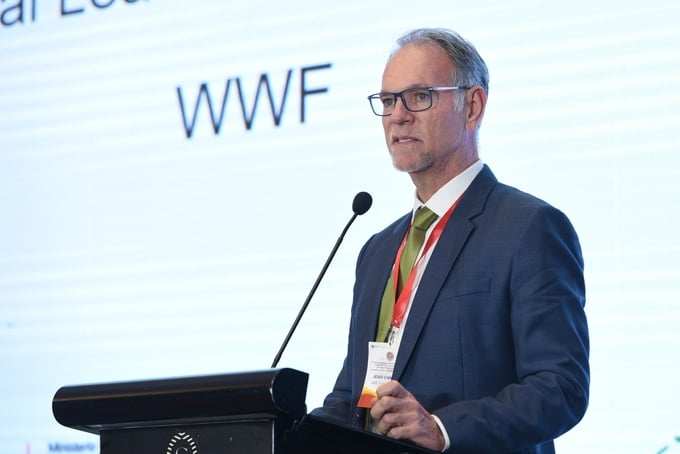
Mr. Joao Campari, Global Leader of WWF's Food Practice believes that there is a need for the development of the food system on a national, regional level instead of a global system to make the transformation suitable for the context of each country and area. Photo: Tung Dinh.
To transform the food system, there must be a necessary plan and solutions to solve these problems. All of us must participate, working together towards developing a sustainable food system, but must protect and preserve the ecological environment and reduce greenhouse gas emissions. We have long been looking at challenges from the prisms of the global food system, however, we have to be more detailed, dissecting the problem according to the national and regional food system rather than just a global system in order to suit the context of each country and area.
Based on these ideas, Mr. Joao Campari expressed his wish that through this conference, delegates will discuss to take transformative action at the national level. It focuses on the following aspects: Eliminating the ambition gap (the goal must be ambitious enough on a scientific foundation; assessing and learning more about what factors are needed for a safe food system); Eliminate the transition gap (countries prioritize the transition through actions and will have appropriate policy and regulatory processes to implement); Eliminate the implementation gap (a support system needs to be built with the right partners through a reasonable policy procedure, thereby eliminating gaps in the implementation process).
Translated by Samuel Pham

(VAN) In 2024, over 295 million people across 53 countries and territories faced acute hunger—an increase of almost 14 million people compared to 2023, while the number of people facing catastrophic levels of hunger reached a record high.

(VAN) World Environment Day 2025 (June 5) carries the theme 'Beat Plastic Pollution' continuing to emphasize the global urgency of addressing the plastic waste crisis.

(VAN) This was the assessment shared by experts at the workshop titled 'Assessing the Role and Potential of Low-Emission Rice Production Systems in Vietnam,' held on the morning of May 19.

(VAN) Cai Rong Port is the fisheries control center of Quang Ninh, helping to monitor fishing vessels, combat IUU fishing, and remove the EC's 'yellow card'.

(VAN) The German Agricultural Society (DLG) explores the possibility of establishing a mechanization service center in Vietnam’s Mekong Delta to support farmers in accessing and utilizing advanced machinery.

(VAN) On May 16, the Department of Water Resources Management, in collaboration with the Food and Agriculture Organization of the United Nations (FAO), held a signing ceremony for the GEF-8 project document.

(VAN) Food safety, mechanization, vocational training, and market opening are key areas of cooperation expected between the Vietnamese Government and the Federal Republic of Germany.